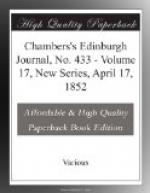Another story of the barbarism of the people was told me on my journey. A farmer’s cow had momentarily trespassed on another man’s land, one of a hostile faction. The farmer offered to pay for the damage, but the reply he received was a shot which killed him on the spot. His brother, who saw the catastrophe, ran to raise the victim; but the man had already reloaded his gun, and shot the brother dead. A third brother, having seen the two fall, ran to the succour so quickly, that the murderer had not time to complete the reloading of his gun; and as a crowd was collecting, he ran off. Mr C—— used every exertion to have him taken, and for three years was unsuccessful; until obtaining the aid of a neighbour, a petty chieftain of a hostile clan, he at last succeeded. On the trial, one of the men who had witnessed the murders, and whom Mr C—— called to swear informations, denied the guilt of the accused, swore an alibi, and declared that he had on the day in question sold him a cow at a fair twenty miles distant. He was, however, convicted, and hanged on the spot where the murders were committed. By punishments of various kinds—transporting the most hardened, and sending others to the treadmill—the people were at length brought into some sort of order.
Tim Halisy was Mr C——’s right-hand man—his manager, sub-agent, &c.: he was rich in cows and sheep; and though rather advanced in life, he married a very young girl, who had a fortune of forty cows. By degrees, Tim grew careless, lost his office, and resolved henceforth to enjoy a life of luxury. His habits became deteriorated; and during the latter years of his life, a gallon of whisky was sent for daily to the public-house; and this was put into the milk-pails, and the cows milked into it. Upon this sustenance, Tim and his wife lived; they spent the whole day at home drinking, and were not known to use bread or animal food. As may be supposed, the cows soon came to the market one by one; and Tim and his wife, after years of misery, died in great indigence.
In the year 1822, Mr C—— commenced his local improvements. The first thing he did was to obtain the opening of a new line of road from Macroom to Killarney, and another to Kenmare. In the various works connected with these, the people first learned the use of the spade and shovel, and became inured to a continued day’s work. There was now a possibility of carrying corn to market if grown, or of bringing it into the parish; and Mr C—— built a mill for grinding it. He also built an inn, and induced a coach-proprietor to run his coach from Cork to Killarney through Ballyvourney, it being a better line in distance, level, picturesque, and beautiful—far surpassing in every respect the old road by Millstreet. He gave sixty acres of land for a clergyman’s glebe, built a house for him, and undertook—long previous to the late laws—the payment of the incumbent. The Board of First Fruits built a church, but were




